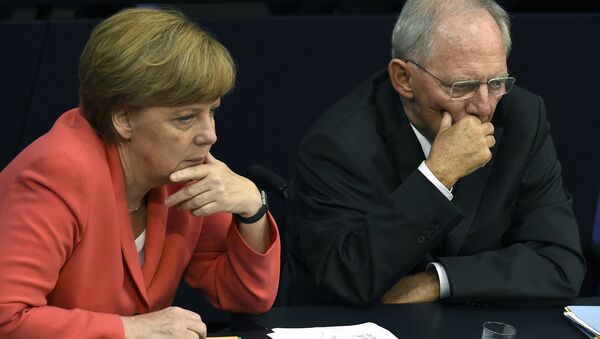"We are committed to ensuring that Greece can remain in the Eurozone," Merkel told the German Parliament, the Bundestag. She has been campaigning for a negotiating mandate on the third aid program for Greece.
"We bend our contracts and rules to the point that they are no longer worth anything. Such an approach would lead to the end of the legal community in Europe."
She said the second alternative, a Greek exit from the Eurozone, was not a solution. "Chaos and violence in Greece could be the result," said the Chancellor. "Such an approach would be the end of the community of responsibility within Europe."
The Greek Parliament agreed to the latest round of austerity measures in return for a further bailout during a tense parliamentary session in the early hours of Thursday.
German public opinion on Greece: Bundestag should support aid package today — yes 46%, no 49% http://t.co/JEbJ0qU9p0 pic.twitter.com/GdynHyzwiP
— Joerg Forbrig (@JoergForbrig) July 17, 2015
Merkel needed to gain the assent from her own parliament Friday to go ahead with the bailout package under the European Stability Mechanism.
Merkel Loses IMF Backing
The International Monetary Fund (IMF) published a report this week which said Greece's public debt has become "highly unsustainable", dealing a massive blow to Merkel, desperate not to preside over a Grexit. The IMF says Greek debt would peak at close to 200 percent of GDP in the next two years, which it said is impossible to service.
#Greece under #Merkel's austerity must endure yrs of pointless suffering as #IMF has confirmed bailout will not work pic.twitter.com/qFm9SNLIdm
— Ronan Tynan (@RonanLTynan) July 16, 2015
Merkel is facing a tough battle against public opinion which is weary of yet another bailout for Athens. Dr Angelos Chryssogelos, Academy Senior Fellow at the London-based Royal Institute of International Affairs — Chatham House — told Sputnik:
"The IMF has a very specific opinion about Greece: its debt is not sustainable. The problem, of course, is that this is right now, and it is politically impossible for many EU members to agree on [the bailout package] precisely because they see that Greece hasn't done enough on the reform side."
NEIN NEIN NEIN #greece,#grexit,#BoycottGermany,#merkel,#Schaeuble pic.twitter.com/emF3gAl4mR
— Sandrine N. Becker (@sandrinebecker) July 17, 2015
Worse still for Merkel, her own finance minister Wolfgang Schäuble has strongly argued that it would make more sense for Athens to leave the Eurozone temporarily rather than take another bailout.
We must help #Greece & keep #Europe together — says @Wolf_Schauble in #Bundestag @France24_en pic.twitter.com/EsecOVBIrw
— Méabh (@Brusselsness) July 17, 2015
Passions run high in Germany over the euro and the Greek bailout. Few have forgotten the hardship that western Germany had to endure after reunification, when the new German Government agreed, in 1990, to match the strong Westmark with the weak Ostmark on a Mark-for-Mark basis. This was a significant moment in German history.
Many believe that poor fiscal policies and overgenerous pensions have brought the Greeks to their knees and that Greece should endure more pain, or should exit the Eurozone. There is growing public opinion — expressed Friday in the Bundestag — that Europe and Germany have done enough for Greece and the latest bailout is one too far.
Merkel got her way in the end, but the domestic political damage to her has been done.





